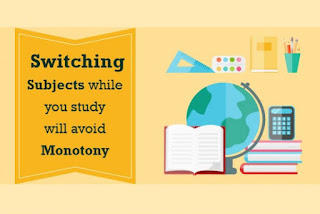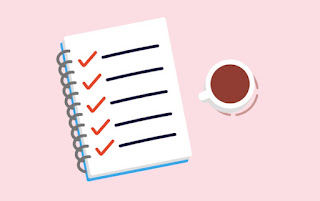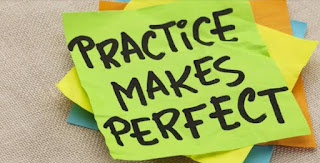TIPS TO STUDY FOR EXAMS
Taking exams is stressful, but you can make it easier by improving the way you study. Studying for your exams effectively and efficiently will keep you from feeling unprepared, and it will set you up for success! Studying for 12 hours or 14 hours a day is very unhealthy; yet we force ourselves to study almost all day in the days before our exam to finish our syllabus. Obviously this is not the best thing to do. So what to do in order to perform our best in exams? Are there any study tips to perform better in exams? For those of you who neglect your textbooks all through the year, exams turn into a nightmare. It becomes a race to see how fast you can cram a year's worth of syllabus. With the Board exams around the corner, there are many of you probably doing the same.
During a time of such intense exam pressure, you first need to realise that studying for 12 hours a day is not something very healthy and you can rarely, if ever, adapt yourself to doing something like that.
What is most effective is studying with full concentration in small pockets and taking short breaks in between. Your focus shouldn't be on HOW LONG you studied but on HOW MUCH you studied.
Here are a few tips that can make your long study sessions the most effective and help you concentrate the most:
1. Apply the 30-60 principle
30-60 principle states that studying less than 30 minutes and more than 60 minutes is not effective. You all have heared of pomodoro technique, (study for 25 minutes and then take 5 minute break) which is a very famous technique but, I don't prefer this. I will recommend 30-60 principle or you can study for 50 minutes then take 5 or 10 minutes break.
2. Take regular breaks
Breaks increase productivity and creativity.
Working for long stretches without breaks leads to stress and exhaustion.Taking breaks refreshes the mind, replenishes your mental resources, and helps you become more creative. “Aha moments” came more often to those who took breaks, according to research.
3. Shift between subjects
Before you schedule your study list for the day, you need to take into account that the subjects we learn can be divided into three categories:
Memory dependant subjects like Biology, History and Geography, which contain a lot of material that need to be mugged up.
Problem-solving subjects such as Maths and Physics.
Interpretation based subjects such as English Literature and literature papers from other languages.
For most effective studying, you should alternate between each category of subjects in long study periods.
4. Make effective notes
Proper note taking is very important for effectively completing the syllabus at the last minute. The scientifically proven method of note-taking that work the best-SQ5R
SQ5R is short for Survey, Questions, Read, Record, Recite, Review and Reflect.
- Survey: Skim through the textbook and mark important areas. Don't take more than 7-10 minutes
- Question: In your textbook, turn the headings and subheadings into questions that could be asked in the exam. Jot down possible questions at the side of important portions of text
- Read, Record, Recite: Go through the text again and record important points in your own words separately. Put them in bullets or in boxes for better visual representation. Recite the points you noted to yourself
- Review: Ask yourself the questions you noted and see if you can answer them properly
- Reflect: Repeat the above steps and reflect on the topic you learned till it's completely memorised
This seems like a no-brainer, but actually paying attention while you're in class will help you immensely once exam time comes. Don't fall into the trap of thinking you'll just "absorb" knowledge; be an active learner. Try sitting at the front of the class, this will make it easier to focus.
- Listen carefully, because teachers often give hints like "The most important thing about this topic is...". Or they may just place emphasis on certain words and issues. This is the real key to testing well. The more you absorb the information early on, the less studying you'll need to do.
Too often, it's easy to view studying as something that only gets done at the last minute in a huge overnight cram session. Instead, try setting aside some time every day to study. Scheduling it just like another appointment or class may help you stay motivated to continue the habit.
7. Ask yourself questions about your material
This can help you tell if you have remembered what you just studied. Don't try to remember the exact wording from your notes in your answer to yourself; synthesizing that information into an answer is a much more useful tactic.
- It can also help to say the answers to your questions out loud, as if you were trying to explain it to someone else.
If you missed questions on previous work, look up the answers and understand why you missed these questions. This is particularly helpful if the exam you're studying for is cumulative or comprehensive, meaning it covers things you also covered earlier in the course.
9. Find your golden hour
—Some of us are morning people, some of us are night owls.Personally, I find high energy levels in the morning around 4:30am to 6:30am. Often, I’ll purposely take some of that time away or schedule more less-strategic tasks during hours when I’m not as enaged. It’s suggested that we should find at least 2 hours a day to dive into the harder strategic work, and leave the other hours for meetings or less urgent tasks.
—Some of us are morning people, some of us are night owls.Personally, I find high energy levels in the morning around 4:30am to 6:30am. Often, I’ll purposely take some of that time away or schedule more less-strategic tasks during hours when I’m not as enaged. It’s suggested that we should find at least 2 hours a day to dive into the harder strategic work, and leave the other hours for meetings or less urgent tasks.
You’ll also identify patterns and when you could engage in “deep work” or the idea of focused work for longer periods of time. This is the concept from Georgetown professor Cal Newport. Some work (like answering emails) is shallow, while others (like coming up with new campaign concepts or intense photo editing) may need more focused time or “deep work.”
10. It's better to say 'no'
— Don’t say yes to every request. Most of us have a deep need to be liked. That translates into us saying yes to everything – which is the end of your elite productivity. This very famous quote also say this:-'YOU HAVE TO SAY 'NO' TO MANY GOOD THINGS
IN ORDER TO
SAY 'YES' TO MANY GREAT THINGS.
11. Eat healthy food
—Eat healthy foods throughout the day to avoid energy crashes and keep your brain properly fuelled
The food we eat is extremely important in boosting our brainpower and impacting how productive we are at work.
Imagine you eat a Snickers bar versus a fruit and nut bar – which do you think is going to give you the energy necessary to finish strong through the afternoon? Junk food not only affects your weight. It also causes decreased productivity and energy crashes.
12. Get sunlight
— According to recent productivity studies, you’ll boost your productivity and alertness with more natural light. Why do you think offices with windows are in such high demand? It also affects the timing of the circadian clock which then impacts your wakefulness and fatigue. And obviously if you are more productive and alert, you will concentrate better in studies and in turn perform better in exams.
13. Walk Before An Exam
It’s been proven that exercise can boost your memory and brain power. Research conducted by Dr. Chuck Hillman of the University of Illinois provides evidence that about 20 minutes exercise before an exam can improve performance.
14. Speak Out Loud Instead of Simply Reading
Although this may make you look a little crazy, give it a go! You will be surprised how much more you can remember when you’ve said it out loud. Warning: Don’t try this in a crowded library!
15. avoid studying at night
It has been Scientifically proven that studying at night or sleep deprivation causes less working memory ,reduce ability to execute functions and also lowers your physical reaction time. Lack of sleep causes a lot of tiredness which eventually lowers your brain functionality. Studying during daytime as much as possible and have a peaceful sleep at night.
16. Study in small chunks
You should study for 45 to 50 minutes and take 5 to 10 minutes break. If you are not able to finish a particular topic in that time period ,this is where the ZEIGARNIK EFFECT comes into picture which says that people remember uncompleted or interrupted tasks better than completed tasks. Sitting for 8 to 10 hours at once is not a good idea now why this? This is because in short repetitive sessions the brain is better at translating information into synapse. ( synapse is a mechanism that enables a neuron to transfer an electrical or chemical signal to another neuron)
17. keep a goal
Keep small Small goals for yourselves like learning the Pythagoras theory or the parts of human brain. Study one topic at a time and make sure that you not just understand the topic but you should also be able to teach that concept to someone else too. If you have one target then you can focus more and better.
18. Music
Good music helps in studying but what matters the most is that which type of music you are listening. The trick is to choose music that is different from your favourite genre and music with a repetitive pulse. Choose neutral music or classical music and don’t play it too loud. Remember that we are talking about music not songs. Choose a music with minimum or zero lyrics.
19. Make flashcards
A lot of you must be marking important statements in your book so that it will be easier for you to revise it later, there’s scientifically better option to revise that is by making flash cards when you randomly highlight a lot of things on a paper ,your brain cannot connect any of those topics together causing a fright it also draws unnecessary attention to the topics which are not very important and also on the other hand when you look at the front side of a flashcard and think of an answer you are engaging a mental faculty known as active recall ,in other words you try to remember the Idea from the scratch instead of just looking at the paragraph in your textbook.
20. Practice
Practice as much you can the more you practice the more confident you get. By taking practice tests you can know how much more efforts you still want to put in so just practice practice practice.
21. Keep distractions away
Keep your phone or any other distraction away from your study area. If want to research something online then ( if available ) try to remove all the distractions from one of your electronic devices for example : delete YouTube, twitter, instagram, facebook, whatsapp etc distracting thing from your computer so that if you turn on Wi-Fi or internet no unnecessary notifications will not distract you.
22. Create Mental Associations
The ability to make connections is not only an easier way to remember information, but it’s the fuel of creativity and intelligence. Steve Jobs famously said “Creativity is just connecting things. When you ask creative people how they did something, they feel a little guilty because they didn’t really do it, they just saw something”.
Mind Maps are an easy way to connect ideas by creating a visual overview of different connections. Read more about the benefits of using Mind Maps to learn here.
23. Draw Diagrams
Drawing diagrams will help you to visualise information which would be hard to describe. This creates a visual memory in your mind which can be recalled in an exam. You may even be asked to draw or label diagrams such as the human heart in your exam so get practicing!
24. Meditate
Meditation is one of the study methods that can help students stay focused when studying. Not only will meditation help you concentrate when studying but it will help reduce pre-exam stress as it improves both mental and physical health.
25. Feynmen technique
In addition to helping you pinpoint those problem areas in the concept you're trying to learn, the Feynman Technique gives you a quick, efficient way to shore up those areas using targeted learning. It's a simple technique, but it'll help you study much more efficiently once you put into action.
Conclusion
It has been Scientifically proven that studying at night or sleep deprivation causes less working memory ,reduce ability to execute functions and also lowers your physical reaction time. Lack of sleep causes a lot of tiredness which eventually lowers your brain functionality. Studying during daytime as much as possible and have a peaceful sleep at night.
16. Study in small chunks
You should study for 45 to 50 minutes and take 5 to 10 minutes break. If you are not able to finish a particular topic in that time period ,this is where the ZEIGARNIK EFFECT comes into picture which says that people remember uncompleted or interrupted tasks better than completed tasks. Sitting for 8 to 10 hours at once is not a good idea now why this? This is because in short repetitive sessions the brain is better at translating information into synapse. ( synapse is a mechanism that enables a neuron to transfer an electrical or chemical signal to another neuron)
17. keep a goal
Keep small Small goals for yourselves like learning the Pythagoras theory or the parts of human brain. Study one topic at a time and make sure that you not just understand the topic but you should also be able to teach that concept to someone else too. If you have one target then you can focus more and better.
18. Music
Good music helps in studying but what matters the most is that which type of music you are listening. The trick is to choose music that is different from your favourite genre and music with a repetitive pulse. Choose neutral music or classical music and don’t play it too loud. Remember that we are talking about music not songs. Choose a music with minimum or zero lyrics.
19. Make flashcards
A lot of you must be marking important statements in your book so that it will be easier for you to revise it later, there’s scientifically better option to revise that is by making flash cards when you randomly highlight a lot of things on a paper ,your brain cannot connect any of those topics together causing a fright it also draws unnecessary attention to the topics which are not very important and also on the other hand when you look at the front side of a flashcard and think of an answer you are engaging a mental faculty known as active recall ,in other words you try to remember the Idea from the scratch instead of just looking at the paragraph in your textbook.
20. Practice
Practice as much you can the more you practice the more confident you get. By taking practice tests you can know how much more efforts you still want to put in so just practice practice practice.
21. Keep distractions away
Keep your phone or any other distraction away from your study area. If want to research something online then ( if available ) try to remove all the distractions from one of your electronic devices for example : delete YouTube, twitter, instagram, facebook, whatsapp etc distracting thing from your computer so that if you turn on Wi-Fi or internet no unnecessary notifications will not distract you.
22. Create Mental Associations
The ability to make connections is not only an easier way to remember information, but it’s the fuel of creativity and intelligence. Steve Jobs famously said “Creativity is just connecting things. When you ask creative people how they did something, they feel a little guilty because they didn’t really do it, they just saw something”.
Mind Maps are an easy way to connect ideas by creating a visual overview of different connections. Read more about the benefits of using Mind Maps to learn here.
23. Draw Diagrams
Drawing diagrams will help you to visualise information which would be hard to describe. This creates a visual memory in your mind which can be recalled in an exam. You may even be asked to draw or label diagrams such as the human heart in your exam so get practicing!
24. Meditate
Meditation is one of the study methods that can help students stay focused when studying. Not only will meditation help you concentrate when studying but it will help reduce pre-exam stress as it improves both mental and physical health.
25. Feynmen technique
In addition to helping you pinpoint those problem areas in the concept you're trying to learn, the Feynman Technique gives you a quick, efficient way to shore up those areas using targeted learning. It's a simple technique, but it'll help you study much more efficiently once you put into action.
Conclusion
I hope these tips will help you to perform better in your studies and exams. If you don't study with full dedication then no tip will be useful for you therefore give your best and don't worry about the marks. If you like this blog post then don't forget to tell us in the comments down below and follow this blog to get notified whenever I upload a helpful blog post like this one.

























No comments:
Post a Comment